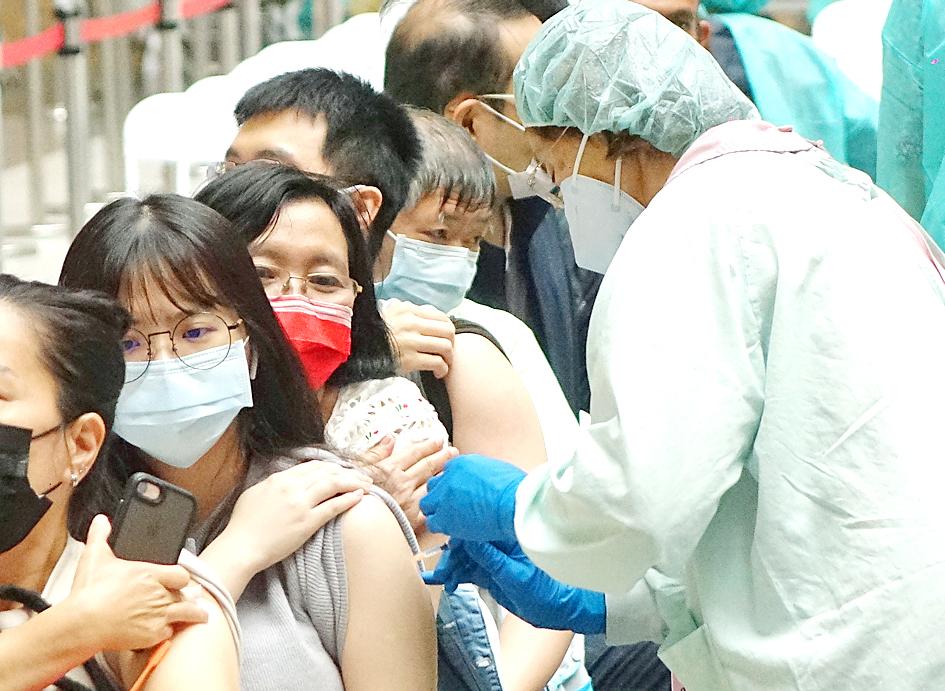Total premiums from sales of COVID-19 policies by local insurance companies grew to NT$1.91 billion (US$64.24 million) as of Monday, which is slightly higher than the cumulative amount of compensation of NT$1.8 billion paid to those infected or in quarantine, Financial Supervisory Commission (FSC) data showed.
The commission yesterday refused to forecast whether compensation would surpass premium income, but the data indicate that cumulative compensation rose much more rapidly over the past week than premium income — the amount of compensation grew 66 percent from NT$1.08 billion a week earlier, while premium income gained 3.2 percent from NT$1.85 billion.
The number of COVID-19 insurance policies sold rose 4 percent from a week earlier to 2.5 million, while a total of 49,904 policyholders had been compensated as of Monday, up 78 percent from 27,943 a week earlier, the data showed.

Photo: Pan Shao-tang, Taipei Times
Because many local insurance companies have stopped offering policies that compensate policyholders who are infected with COVID-19 or have to undergo quarantine, there are only four COVID-19 policies remaining on the market and they only offer coverage for those with severe symptoms, the data showed.
In related news, the FSC yesterday said that insurance companies cannot refuse to compensate those who choose to follow a “3+4” policy — isolate at home for three days and practice self-disease prevention for four days.
The commission’s comment came after lawmakers criticized some companies for rejecting the compensation claims of those who chose to follow the “3+4” policy, even though they were eligible to avoid quarantine by opting for the “0+7” policy.
The Central Epidemic Command Center on Monday announced that close contacts of COVID-19 cases who have received a booster shot no longer need to isolate at home and can choose to follow the “0+7” policy — just seven days of self-disease prevention.

Taiwan will prioritize the development of silicon photonics by taking advantage of its strength in the semiconductor industry to build another shield to protect the local economy, National Development Council (NDC) Minister Paul Liu (劉鏡清) said yesterday. Speaking at a meeting of the legislature’s Economics Committee, Liu said Taiwan already has the artificial intelligence (AI) industry as a shield, after the semiconductor industry, to safeguard the country, and is looking at new unique fields to build more economic shields. While Taiwan will further strengthen its existing shields, over the longer term, the country is determined to focus on such potential segments as

UNCERTAINTY: Innolux activated a stringent supply chain management mechanism, as it did during the COVID-19 pandemic, to ensure optimal inventory levels for customers Flat-panel display makers AUO Corp (友達) and Innolux Corp (群創) yesterday said that about 12 to 20 percent of their display business is at risk of potential US tariffs and that they would relocate production or shipment destinations to mitigate the levies’ effects. US tariffs would have a direct impact of US$200 million on AUO’s revenue, company chairman Paul Peng (彭雙浪) told reporters on the sidelines of the Touch Taiwan trade show in Taipei yesterday. That would make up about 12 percent of the company’s overall revenue. To cope with the tariff uncertainty, AUO plans to allocate its production to manufacturing facilities in

COLLABORATION: Given Taiwan’s key position in global supply chains, the US firm is discussing strategies with local partners and clients to deal with global uncertainties Advanced Micro Devices Inc (AMD) yesterday said it is meeting with local ecosystem partners, including Taiwan Semiconductor Manufacturing Co (TSMC, 台積電), to discuss strategies, including long-term manufacturing, to navigate uncertainties such as US tariffs, as Taiwan occupies an important position in global supply chains. AMD chief executive officer Lisa Su (蘇姿丰) told reporters that Taiwan is an important part of the chip designer’s ecosystem and she is discussing with partners and customers in Taiwan to forge strong collaborations on different areas during this critical period. AMD has just become the first artificial-intelligence (AI) server chip customer of TSMC to utilize its advanced

Chizuko Kimura has become the first female sushi chef in the world to win a Michelin star, fulfilling a promise she made to her dying husband to continue his legacy. The 54-year-old Japanese chef regained the Michelin star her late husband, Shunei Kimura, won three years ago for their Sushi Shunei restaurant in Paris. For Shunei Kimura, the star was a dream come true. However, the joy was short-lived. He died from cancer just three months later in June 2022. He was 65. The following year, the restaurant in the heart of Montmartre lost its star rating. Chizuko Kimura insisted that the new star is still down